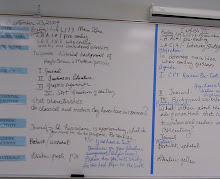Monday, August 10, 2009
What is Response to Intervention? (RtI)
Response to Intervention (RtI) provision included in the 2004 re-authorization of the Individuals with Disabilities Education Act (IDEA) is one of the most significant recent developments in education, requiring a renewed focus on collaboration among general and special educators in order to promote the achievement of struggling learners. RtI is an approach that instructs and monitors the progress of all students to ensure they receive interventions, supports and accommodations as needed to meet local, state, and national standards (Yell & Drasgow, 2007). The model is predicated on a set of assumptions that includes the use of scientifically-based curricula in the general education setting, regular administration of universal screenings, use of a problem-solving or standard-protocol approach to making data-based decisions, identification and use of a tiered system of intervention and support, assurance of fidelity in the delivery of instruction and targeted interventions, and ongoing progress monitoring for identified students (Fuchs et al, 2005; Fuchs & Deshler, 2007; Fuchs, Fuchs & Prentice, 2005). Students who fail to make progress within the RtI model may be referred for a special education evaluation, with available data being used to documents the presence of a learning disability (Batsche et al., 2006; Gresham, 2002; Peterson & Shinn, 2002). RtI would be infused across both VEIN priorities as an effective early intervention strategy for regular classroom teachers.







